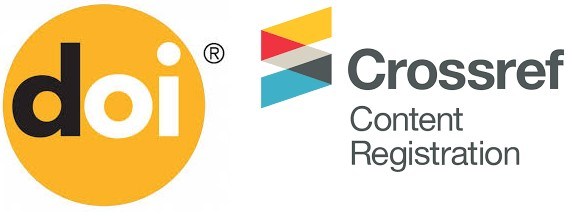Aspek Imunologi pada Diagnosis dan Tatalaksana Graves’ Disease
DOI:
https://doi.org/10.33854/heme.v7i3.1722Keywords:
Graves’ disease, tatalaksana terbaru, imunologiAbstract
Graves’ Disease (GD) adalah penyebab hipertiroidisme paling umum yang mengenai kelenjar tiroid. Penyakit ini merupakan salah satu bagian dari Autoimmune Thyroid Disease (AITD) yang bersifat spesifik organ (tiroid), yang ditandai dengan adanya autoantibodi yang menstimulasi Thyroid Stimulating Hormone Receptor (TSHR) pada kelenjar tiroid yang akan menyebabkan hiperplasia tiroid atau struma serta peningkatan produksi dan sekresi hormon tiroid. Graves’ disease merupakan interaksi yang kompleks antara mekanisme imunologi dan disfungsi tiroid. Penyakit ini berdampak negatif pada kualitas hidup dan dapat menimbulkan risiko psikosis, takiaritmia, dan gagal jantung. Sifat autoimunitas GD menyebabkan penyakit ini dapat kambuh kembali, sehingga pengelolaannya memerlukan waktu yang lebih lama, sama seperti pada penyakit autoimun lainnya. Pada penyakit ini, target pengobatan terbaru yaitu dengan memerhatikan mekanisme imunopatogenesis dasar terjadinya penyakit. Oleh karena itu, pemahaman yang mendalam tentang aspek imunologis GD, dapat memfasilitasi pengembangan terapi yang lebih baik, yaitu terapi yang berfokus pada modulasi respons imun yang menjadi fokus utama dalam upaya untuk mengendalikan aktivitas penyakit dan mencegah komplikasi jangka panjang.References
Taylor PN, Albrecht D, Scholz A, Gutierrez-Buey G, Lazarus JH, Dayan CM, et al. Global epidemiology of hyperthyroidism and hypothyroidism. Nat Rev Endocrinol. 2018 May;14(5):301-316
Hussain YS, Hookham JC, Allahabadia A, Balasubramanian SP. Epidemiology, management and outcomes of Graves' disease-real life data. Endocrine. 2017;56(3):568-578.
Bartalena L, Piantanida E, Gallo D, Lai A, Tanda ML. Epidemiology, natural history, risk factors, and revention of graves' orbitopathy. Front Endocrinol :Lausanne. 2020 Nov 30.
Rosenbaum JT, Choi D, Wong A, Wilson DJ, Grossniklaus HE, Harrington CA, et al. The Role of the Immune Response in the Pathogenesis of Thyroid Eye Disease: A Reassessment. PLoS One. 2015 Sep 15;10(9).
Davies TF, Andersen S, Latif R, Nagayama Y, Barbesino G, Brito M, et al. Graves' disease. Nat Rev Dis Primers. 2020 Jul 2;6(1):52.
Decroli E, Elvira D, Aprilia D. The effect of thionamide on TRH, TSH, IL-4, T-REG, and anti-TPO in Graves’ disease. Indonesian Journal of Pharmacy. 2019;30(2):122-127.
Jameson JL, Mandel SJ, Weetman AP. Hyperthyroidism and other causes of thyrotoxicosis. In : Jameson JL, Fauci AS, Kasper DL, Hauser SL, Longo DL, Loscalzo J, editors. Harrison's Principles of Internal Medicine. New York NY: McGraw Hill Education. 2022;21:2938-45
Decroli E, Elvira D, Aprilia D. The profile of thyrotropin-releasing hormone, T-regulator, and interleukin-4 of untreated Graves’ disease in Indonesia. Asian Journal of Pharmaceutical and Clinical Research. 2020;13(7):57-59
Smith, Terry J, Laszlo H. Graves' disease. The New England journal of medicine. 2016; 375(16): 1552-1565.
Arata N, Ando T, Unger P, Davies TF. By-stander activation in autoimmune thyroiditis: studies on experimental autoimmune thyroiditis in the GFP+ fluorescent mouse. Clin. Immunol. 2006;121: 108–117.
Sanders J, Chirgadze DY, Sanders P, Baker S, Sullivan A, Bhardwaja A, et al. Crystal structure of the TSH receptor in complex with a thyroid-stimulating autoantibody. Thyroid. 2007;17(5):395-410.
Morshed SA, Ma R, Latif R, Davies TF. Biased signaling by thyroid-stimulating hormone receptor-specific antibodies determines thyrocyte survival in autoimmunity. Sci Signal. 2018;11(514).
Bell L, Hunter AL, Kyriacou A, Mukherjee A, Syed AA. Clinical diagnosis of Graves' or non-Graves' hyperthyroidism compared to TSH receptor antibody test. Endocr Connect. 2018;7(4):504-510.
Cappelli C, Gandossi E, Castellano M, Pizzocaro C, Agosti B, Delbarba A, et al. Prognostic value of thyrotropin receptor antibodies (TRAb) in Graves' disease: a 120 months prospective study. Endocr J. 2007;54(5):713-20.
Eckstein AK, Plicht M, Lax H, Neuhäuser M, Mann K, Lederbogen S, et al. Thyrotropin receptor autoantibodies are independent risk factors for Graves' ophthalmopathy and help to predict severity and outcome of the disease. J Clin Endocrinol Metab. 2006;91(9):3464-70.
Ross DS, Burch HB, Cooper DS, Greenlee MC, Laurberg P, Maia AL, et al. 2016 American Thyroid Association Guidelines for Diagnosis and Management of Hyperthyroidism and Other Causes of Thyrotoxicosis. Thyroid. 2016;26(10):1343-1421.
Kahaly GJ, Bartalena L, Hegedüs L, Leenhardt L, Poppe K, Pearce SH. 2018 European Thyroid Association Guideline for the Management of Graves' Hyperthyroidism. Eur Thyroid J. 2018;7(4):167-186.
Lee ACH, Kahaly GJ. Novel Approaches for Immunosuppression in Graves' Hyperthyroidism and Associated Orbitopathy. Eur Thyroid J. 2020;9(Suppl 1):17-30.
El Fassi D, Nielsen CH, Bonnema SJ, Hasselbalch HC, Hegedüs L. B lymphocyte depletion with the monoclonal antibody rituximab in Graves' disease: a controlled pilot study. J Clin Endocrinol Metab. 2007;92(5):1769-72
Heemstra KA, Toes RE, Sepers J, Pereira AM, Corssmit EP, Huizinga TW, Romijn JA, Smit JW. Rituximab in relapsing Graves' disease, a phase II study. Eur J Endocrinol. 2008;159(5):609-15.
Lane LC, Cheetham TD, Perros P, Pearce SHS. New Therapeutic Horizons for Graves’ Hyperthyroidism. Endocr Rev. 2020;41(6):873–84.
Fharel, M., Anggraini, D., & Rafli, R. (2024). Deteksi dini gangguan fungsi tiroid pada bayi baru lahir di RSI Siti Rahmah Padang tahun 2023. Jurnal Pengabdian Masyarakat Kesehatan (JURABDIKES), 2(2), 82-86
Pearce SHS, Dayan C, Wraith DC, Barrell K, Olive N, Jansson L, et al. Antigen-Specific Immunotherapy with Thyrotropin Receptor Peptides in Graves’ Hyperthyroidism: A Phase I Study. Thyroid. 2019;29(7):1003–11.
Furmaniak J, Sanders J, Young S, Kabelis K, Sanders P, Evans M, et al. In vivo effects of a human thyroid-stimulating monoclonal autoantibody (M22) and a human thyroid-blocking autoantibody (K1-70). Auto Immun Highlights. 2011;3(1):19-25
Furmaniak J, Sanders J, Sanders P, Li Y, Rees Smith B. TSH receptor specific monoclonal autoantibody K1-70TM targeting of the TSH receptor in subjects with Graves' disease and Graves' orbitopathy-Results from a phase I clinical trial. Clin Endocrinol (Oxf). 2022;96(6):878-887
















